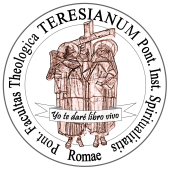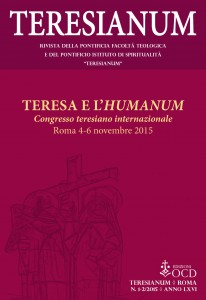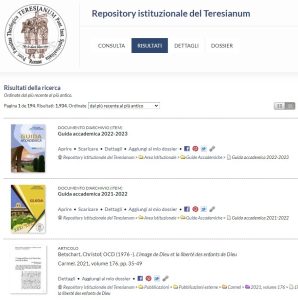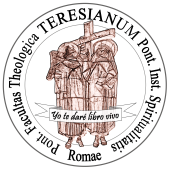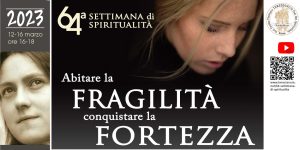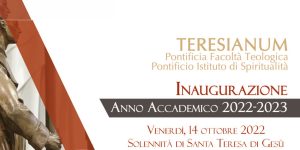The Theological Faculty of St. Teresa and St. John of the Cross (cf. Statute, art. 1) situated in the Teresianum in Rome, was consituted as the International College of the Order of Discalced Carmelites by the Sacred Congregation for Seminaries and Universities for Studies in a Decree published on 16th July 1935 and 23rd May, being accorded the title of ‘Pontifical’ by the same Congregation.
The Faculty proposes not only to develop Sacred Theology according to the scientific method, but also to dedicate itself more profoundly in fidelity to the charism of its illustrious Teachers, to the study of Spiritual Theology and its relationship with Christian spiritual life.
This particular commitment has been confirmed and strongly supported by the same Congregation and by the Roman Pontiffs. On account of this, in 1957, the Faculty founded the Institute of Spirituality under the same roof, whilst maintaining established activities (cf. Statute, art. 3a). Seven years later, it was also accorded the title ‘Pontifical’, and in accordance with the Decree promulgated by the Sacred Congregation for Seminaries and Universities of Studies on 8th September, 1964, authority to confer academic degrees was granted.
The Faculty of Theology, particularly through the Institute, propitiously endowed with publications and a Library, seeks to fulfil the specific duty of deepening the discipline of Spiritual Theology more intensely for the good of the Church and the benefit of Christian people.
At the present moment, the Institute of Spirituality comprises four departments:
- A specialist academic department offering two courses: at the level of licentiate and doctorate (cf. Statute, artt. 3b-c; 4);
- A department of Spiritual Theology offering a corresponding Diploma with two modes of teaching: one residential, one online;
- A department for Formators and those in charge of Communities of Sacred Life and the Societies of Apostolic Life with a corresponding Diploma;
- A department for Spiritual Direction offering a corresponding Diploma.
From 2000-2003, the Institute developed the department for Pastoral Counselling, later known as Spiritual Counselling – the School of Mystagogy (2003-2019).
In 1982, a department was opened for specialisation in Theological Anthropology, which from 2005 to 2019 onwards was known as Christian Anthropology. This specialisation offers two courses: at the level of licentiate and doctorate (cf. Statute, artt. 3b-c; 4).
The Statutes of the Theological Faculty of the International College of St. Teresa of Jesus and St. John of the Cross, approved by the Sacred Congregation for Seminaries and Universities on 16th May, 1935, provided the first regulations governing our Institution.
The regulations, revised according to the directives of the Normae Quaedam and approved ad experimentum by the Sacred Congregation for Catholic Education on 12th March, 1973, were re-examined in the light of the principles of the Apostolic Constitution Sapientia Christiana on 15th April, 1979 and according to the Ordinationes and other norms issued by the afore-mentioned Sacred Congregation, which were approved definitively on 11th April 1988.
From this time onwards, this centre for ecclesiastical studies took the name Pontifical Theological Faculty Teresianum.
More recently, in the light of the Apostolic Constitution Veritatis Gaudium of 8th December 2017, and of the relevant Norms of the Congregation for Catholic Education, 27th December 2017, along with the subsequent indications given by the Congregation, the Statute of the Faculty have been approved ad experimentum for five years by the Congregation (28th August 2019), thus bringing our Statute up-to-date with the Church’s new legislation and with our Institute’s current situation.
The principal aims of the Faculty include the following:
To cultivate and promote theological disciplines through scientific research, going deeper into Divine Revelation, systematically identifying its truth, in order to shed light on the problems of our times (cf. Statute, art. 2a; Veritatis Gaudium, art. 3 §1);
To form students at the highest level in said disciplines; introduce them to comprehension of the sources and to scientific methodology, both in teaching and with a view to specific responsibilities, above all in the field of spiritual formation (cf. Statute, art. 2d; Veritatis Gaudium, art. 3 §2);
To play an active role in the ministry of evangelization entrusted to the Church, fostering an aptitude for study and encouraging the formation of those who are involved with the spiritual life of Christians and of humanity (cf. Statute, art. 2e-f; Veritatis Gaudium, art. 3 §1).
The Faculty is open to clergy, consecrated men and women and lay people who have the qualifications necessary for admission to the various courses of study, both academic and non-academic and who wish to learn theological disciplines which are nurtured here or to go deeper into the proposed areas of study (cf. Statute, art. 9; Veritatis Gaudium, art. 31).
“The academic year begins in October and finishes in June” (cf. Statute, art. 69).
“L’anno accademico inizia a ottobre e si conclude a giugno” (cf. Statuto, art. 69).
